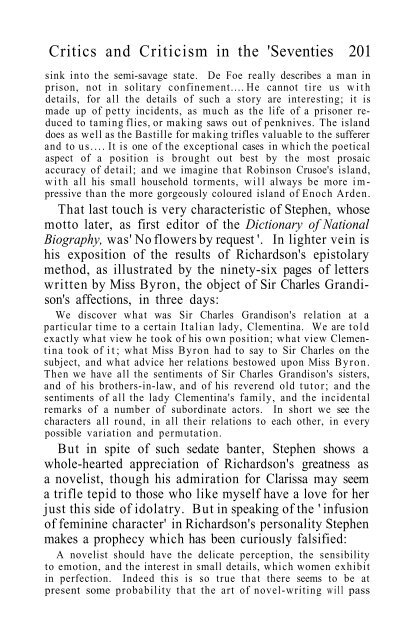R,CHARD MONCKTON MILNES was born in the year - OUDL Home
R,CHARD MONCKTON MILNES was born in the year - OUDL Home
R,CHARD MONCKTON MILNES was born in the year - OUDL Home
Create successful ePaper yourself
Turn your PDF publications into a flip-book with our unique Google optimized e-Paper software.
Critics and Criticism <strong>in</strong> <strong>the</strong> 'Seventies 201s<strong>in</strong>k <strong>in</strong>to <strong>the</strong> semi-savage state. De Foe really describes a man <strong>in</strong>prison, not <strong>in</strong> solitary conf<strong>in</strong>ement.... He cannot tire us withdetails, for all <strong>the</strong> details of such a story are <strong>in</strong>terest<strong>in</strong>g; it ismade up of petty <strong>in</strong>cidents, as much as <strong>the</strong> life of a prisoner reducedto tam<strong>in</strong>g flies, or mak<strong>in</strong>g saws out of penknives. The islanddoes as well as <strong>the</strong> Bastille for mak<strong>in</strong>g trifles valuable to <strong>the</strong> suffererand to us.... It is one of <strong>the</strong> exceptional cases <strong>in</strong> which <strong>the</strong> poeticalaspect of a position is brought out best by <strong>the</strong> most prosaicaccuracy of detail; and we imag<strong>in</strong>e that Rob<strong>in</strong>son Crusoe's island,with all his small household torments, will always be more impressivethan <strong>the</strong> more gorgeously coloured island of Enoch Arden.That last touch is very characteristic of Stephen, whosemotto later, as first editor of <strong>the</strong> Dictionary of NationalBiography, <strong>was</strong>' No flowers by request '. In lighter ve<strong>in</strong> ishis exposition of <strong>the</strong> results of Richardson's epistolarymethod, as illustrated by <strong>the</strong> n<strong>in</strong>ety-six pages of letterswritten by Miss Byron, <strong>the</strong> object of Sir Charles Grandison'saffections, <strong>in</strong> three days:We discover what <strong>was</strong> Sir Charles Grandison's relation at aparticular time to a certa<strong>in</strong> Italian lady, Clement<strong>in</strong>a. We are toldexactly what view he took of his own position; what view Clement<strong>in</strong>atook of it; what Miss Byron had to say to Sir Charles on <strong>the</strong>subject, and what advice her relations bestowed upon Miss Byron.Then we have all <strong>the</strong> sentiments of Sir Charles Grandison's sisters,and of his bro<strong>the</strong>rs-<strong>in</strong>-law, and of his reverend old tutor; and <strong>the</strong>sentiments of all <strong>the</strong> lady Clement<strong>in</strong>a's family, and <strong>the</strong> <strong>in</strong>cidentalremarks of a number of subord<strong>in</strong>ate actors. In short we see <strong>the</strong>characters all round, <strong>in</strong> all <strong>the</strong>ir relations to each o<strong>the</strong>r, <strong>in</strong> everypossible variation and permutation.But <strong>in</strong> spite of such sedate banter, Stephen shows awhole-hearted appreciation of Richardson's greatness asa novelist, though his admiration for Clarissa may seema trifle tepid to those who like myself have a love for herjust this side of idolatry. But <strong>in</strong> speak<strong>in</strong>g of <strong>the</strong> ' <strong>in</strong>fusionof fem<strong>in</strong><strong>in</strong>e character' <strong>in</strong> Richardson's personality Stephenmakes a prophecy which has been curiously falsified:A novelist should have <strong>the</strong> delicate perception, <strong>the</strong> sensibilityto emotion, and <strong>the</strong> <strong>in</strong>terest <strong>in</strong> small details, which women exhibit<strong>in</strong> perfection. Indeed this is so true that <strong>the</strong>re seems to be atpresent some probability that <strong>the</strong> art of novel-writ<strong>in</strong>g will pass
















